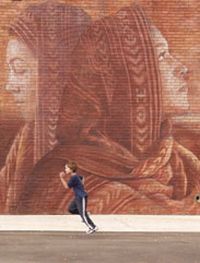 Janus Head Janus Head
11.1&2

Travels Inside the Archive
Robert Gibbons
Edge of Maine Editions

Beyond Time
New & Selected Work
1977 - 2007
Robert Gibbons
 The Age of Briggs & Stratton The Age of Briggs & Stratton
Peter Culley
|
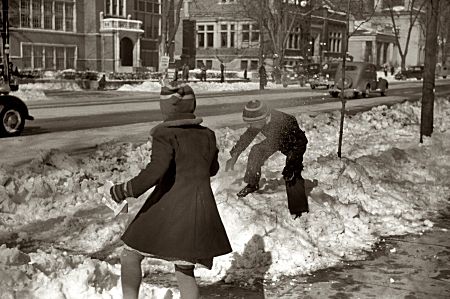 Arthur Rothstein
(1915 - 1985)
_______________________
How to Destroy the Book
Cory Doctorow
From his speech on copyright at the National Reading Summit.
Transcribed by Jade Colbert
We are the people of the book. We love our books. We fill our houses with books. We treasure books we inherit from our parents, and we cherish the idea of passing those books on to our children. Indeed, how many of us started reading with a beloved book that belonged to one of our parents? We force worthy books on our friends, and we insist that they read them. We even feel a weird kinship for the people we see on buses or airplanes reading our books, the books that we claim. If anyone tries to take away our books—some oppressive government, some censor gone off the rails—we would defend them with everything that we have. We know our tribespeople when we visit their homes because every wall is lined with books. There are teetering piles of books beside the bed and on the floor; there are masses of swollen paperbacks in the bathroom. Our books are us. They are our outboard memory banks and they contain the moral, intellectual, and imaginative influences that make us the people we are today.(....)
They say that when you buy an ebook or an audiobook that’s delivered digitally, you are demoted from an owner to a licensor. From a reader to a mere user. These thieves deliver our digital books and our audiobooks wrapped in license agreements and technologies that might as well be designed to destroy the emotional connection that readers have with their books.(....)
... the most important part of the experience of a book is knowing that it can be owned. That it can be inherited by your children, that it can come from your parents. That libraries can archive it, they can lend it, that patrons can borrow it. That the magazines that you subscribe to can remain in a mouldering pile of National Geographics in someone’s attic so you can discover it on a rainy day—and that they don’t disappear the minute you stop subscribing to it. It’s a very odd kind of subscription that takes your magazines away when you’re done [as is the case with most institutional subscriptions with Elsevier, the world’s largest publisher of medical and scientific journals].(....)
Anyone who claims that readers can’t and won’t and shouldn’t own their books are bent on the destruction of the book, the destruction of publishing, and the destruction of authorship itself. We must stop them from being allowed to do it. The library of tomorrow should be better than the library of today. The ability to loan our books to more than one person at once is a feature, not a bug. We all know this. It’s time we stop pretending that the pirates of copyright are right. These people were readers before they were publishers before they were writers before they worked in the legal department before they were agents before they were salespeople and marketers. We are the people of the book, and we need to start acting like it....(more)via Heading East
_______________________
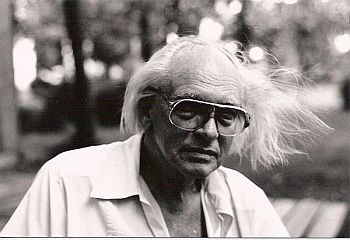
Al Purdy
December 30, 1918 – April 21, 2000 Al Purdy, An Uncommon Poet
CBC archives
Wilderness Gothic
Al Purdy
Across Roblin Lake, two shores away,
they are sheathing the church spire
with new metal. Someone hangs in the sky
over there from a piece of rope,
hammering and fitting God's belly-scratcher,
working his way up along the spire
until there's nothing left to nail on---
Perhaps the workman's faith reaches beyond:
touches intangibles, wrestles with Jacob,
replacing rotten timber with pine thews,
pounds hard in the blue cave of the sky,
contends heroically with difficult problems of
gravity, sky navigation and mythopeia,
his volunteer time and labor donated to God,
minus sick benefits of course on a non-union job---
Fields around are yellowing into harvest,
nestling and fingerling are sky and water borne,
death is yodeling quiet in green woodlots,
and bodies of three young birds have disappeared
in the sub-surface of the new county highway---
That picture is incomplete, part left out
that might alter the whole Dürer landscape:
gothic ancestors peer from medieval sky,
dour faces trapped in photograph albums escaping
to clop down iron roads with matched grays:
work-sodden wives groping inside their flesh
for what keeps moving and changing and flashing
beyond and past the long frozen Victorian day.
A sign of fire and brimstone? A two-headed calf
born in the barn last night? A sharp female agony?
An age and a faith moving into transition,
the dinner cold and new-baked bread a failure,
deep woods shiver and water drops hang pendant,
double yolked eggs and the house creaks a little---
Something is about to happen. Leaves are still.
Two shores away, a man hammering in the sky.
Perhaps he will fall.
_______________________
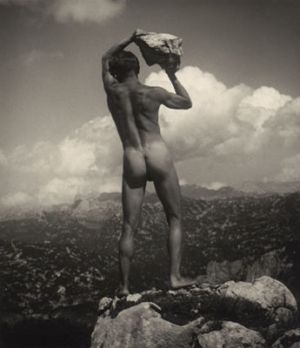
Rock thrower
Rudolf Koppitz
c. 1923
_______________________
Emotional Cartography - Technologies of the Self
Edited by Christian Nold, 2009
Emotional Cartography is a collection of essays from artists, designers, psychogeographers,
cultural researchers, futurologists and neuroscientists, brought together by Christian Nold, to
explore the political, social and cultural implications of visualising intimate biometric data and
emotional experiences using technology.
Essays by Raqs Media Collective, Marcel van de Drift, Dr Stephen Boyd Davis, Rob van
Kranenburg, Sophie Hope and Dr Tom Stafford
_______________________
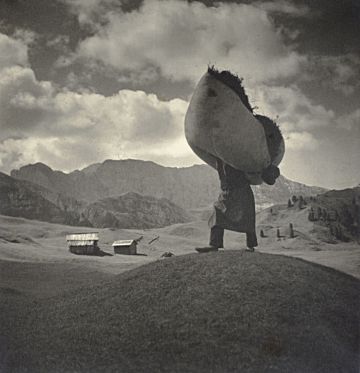
Heavy Burden
c. 1930
Rudolf Koppitz
(1884–1936)
Foto: Modernity in Central Europe
1918-1945
_______________________
Grateful
Ours is just another skin
That simply slips away
You can rise above it
It will shed easily
It all will come out fine
I've learned it line by line
One common wire
One silver thread
All that you desire
Rolls on ahead
Like a ship in a bottle
Held up to the sun
Sails ain't going nowhere
You can count every one
Until it crashes unto the earth
And simply slips away
You can hide in the open
Or just disappear
Ours is just a craving
And a twist of the wrist
Will undo the stopper
With abrupt tenderness
Die little sparrow
And awake
Singing
It all will come out fine
I've learned it line by line
One common wire
One silver thread
All that you desire
Rolls on ahead
- Patti Smith, Gung Ho

Patti Smith
b. Dec. 30, 1946
at jim morrison's grave
pere-lachaise cemetary, paris, france
photo © by claude gassian
_______________________
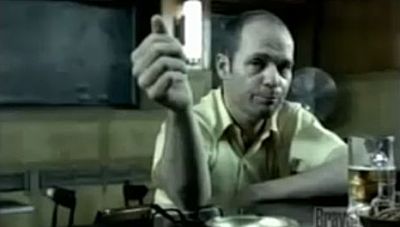
At The Quinte Hotel
Al Purdy and Gordon Downie
youtube
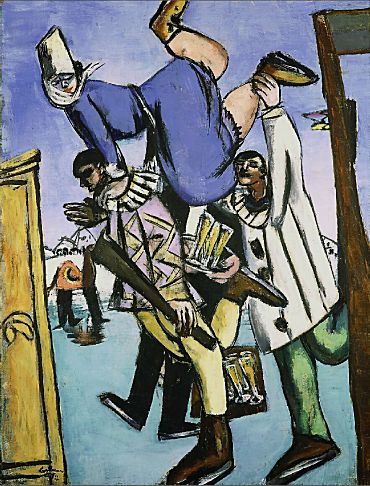
Max Beckmann
(February 12, 1884 – December 28, 1950)
Self-portrait in words: collected writings and statements, 1903-1950
Max Beckmann
google books
_______________________
Canadian Winter, 1960-61
Milton Acorn
Up Spadina, feet like the slow end
of a mutt sniffing from trashcan to pole,
(smutty, scruff, sour-fat on a thin dole,
pausing whole minutes to lick his behind)
regularly — rain, tea-weak sun, or blinding
snow-glutted poundage of a cold gale —
grey, jawdroppy with ragged lips, the pale
men past forty peg to the breadline.
They’ve washed in the dirty water of boredom
and in thinly conscious ways are still here;
but predictable in fluctuation
as spasms of malarial fever
or winged ant exodi. My bizarre sir
stop a minute! think of the word “human.”
_______________________
The New Monastics
Dennis Brutus
Nairobi, November 26, 2007
Tall black-shadowed cypresses
slender beside arcaded cloisters:
thus were monastic enterprises:
now with our new doctrines
secular-consumerist we bend
with similar devoutness in service
to our modern pantheon --
Bretton Woods, its cohort deities
-- World Bank, IMF, WTO --
diligently we recite
"We have loved, o lord, the beauty of your house
and the place where your glory dwells"
"Amen" we chorus in unison
as ordered by our Heads of State
obediently we traipse to our slaughterhouse
directed by our Judas-goats
Mbeki's herds tricked out in shabby rags
discarded by imperialist gauleiters
who devised our Neepad subjugation
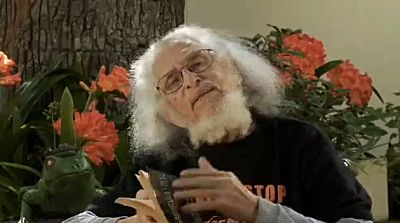 Dennis Brutus
28 November 1924 - 26 December 2009
Dennis Brutus reading 'Longing'
youtube
On The Passing Of South African Poet And Activist Dennis Brutus
Danny Schechter
Remembering anti-apartheid legend, Dennis Brutus
Kim Elliott
An Open Letter to the UN Climate Change Gathering in Copenhagen
Dennis Brutus
10 December 2009
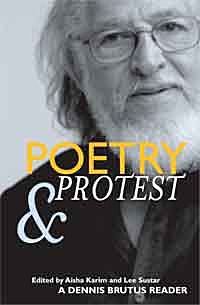
Poetry and Protest: A Dennis Brutus Reader
Haymarket Books
and google books
_______________________
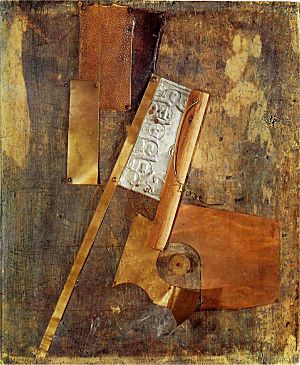
Relief
1914
Vladimir Tatlin
b. 28 December, 1885
_______________________
A Sampler
Peter Culley
mosses from an old manse
in memoriam Jonathan Williams
(....)
Mythago Wood
screech of harrier
screech of owl
permission to dig.
Sump path empties
into high river death splash
paint can pukes
it's last bridge tag.
Landfill campers stumble
four steps from the fence
gullets full of debt
mouths full of pebbles.
...(more)
Peter Culley at the Electronic Poetry Center
_______________________
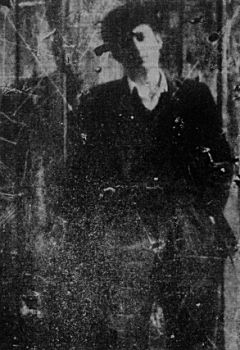
Guy Debord
b. 28 December, 1931
The Society of the Spectacle
Guy Debord at UbuWeb Film
Guy Debord Archive
situationist international online
_______________________
a Life
Ewa Chrusciel
photography by Urszula Lukaszuk
Xcp: Streetnotes: Winter 2006
topology must triumph
over no place
I multiply my flats blueprints palimpsests. This is a reproduction of Being.
Friends, I’m writing to you from US where lots of reality shows and viagra gets shipped to you overnight even if you did not ask for it. You get all the prospects of singles in the neighborhood in your daily bottle of milk patiently browsing outside. I’m trying to be socially involved: I watch Average Joe, War on Terrorism, Empire Strikes Back. I also date on a full scale. Our secret meetings Between the Rockies and Appalachians. He is unpredictable. Whenever he comes near I tremble and lie down. We define ourselves On Fujita Scale. When it’s up I toss and hurl. Yet I learn that his size is not necessarily indication of his intensity. Any time you deliberately put yourself above ground you are putting yourself in his arms. My Tornado Alley. The tip of the day is: when you come round, stay close to the ground. Stay close to the ground.
The threat of atopia calls forth a veritable ontomania, irrational desire to have and to know as much determinate presence as possible. Fear of having an empty mind is really the same fear. If Hebrew Makom means both God and Place, does God have the address? Encounter is a lingusitic cousin of country. A man is insofar as he dwells. I suffer from excess. A fish in water that suffers of thirst. The desire to be everybody. ( Zelig’s syndrome?) A desire to have everything. To transgress. Maybe it’s the same desire that Lascaux Man had? (is that why Tibetans tie their children to the poles - in case they might wander off, get lost?). (Am I a fractal?) The size of my radiance is precisely that volcanic lavish. A sponge suffering, because it cannot saturate itself. A river, suffering because the reflections of clouds and trees are not clouds and trees. ...(more)
StreetnotesEthnography, Poetry, & the Documentary Experience... a biannual electronic exhibition space for socially descriptive art and text.
_______________________

Alasdair Gray
b. 28 December 1934
Photograph: Eamonn McCabe
_______________________
On New Rules for Destroying Old Countries
Ravi Arvind Palat
Critical Asian Studies 37:1 (2005) pp. 75-94
aaaarg - free reg. req.
A hundred years before suicidal hijackers transformed passenger airliners into lethal missiles and launched them into the twin towers of theWorld Trade Center in New York and the Pentagon in Washington, D.C., on 11 September 2001, Liang Qichao, the first Chinese professional journalist, framed the transition of China from a world-in-itself to a state among other states in a memorably titled article, “On the New Rules for Destroying Countries.” Unlike political entities that had earlier been destroyed when their ruling dynasties were defeated, their high officials executed, and their weaponry and wealth confiscated, he argued, Western imperialist powers now practiced “invisible dismemberment”:If one really wants to destroy a people and the state, the whole nation must be destroyed.…In the past, destroyers were like tigers and wolves; today they are like foxes. Either they use commerce, or they use loans, or they train your soldiers, or they establish advisors [in your government], or they build roads, or they use the excuse of quelling [your] internal disorder, or they offer assistance to [your] revolution. Rather than “destroying” the Qing Empire, the Opium Wars and subsequent Western capitalist incursions had reconstituted China as a state within the interstate system by transforming its internal structures in accordance with the rules of that system. Among these were the principles of sovereign equality of states, noninterference by states in the internal affairs of other states, and the acceptance of other protocols that were progressively elaborated by Euro-North American states and then imposed on the global order.
_______________________
Something's Not Right Here
Bill Moyers - Mat Taibbi - Robert Kuttner
One year after the great collapse of our financial system, Wall Street is back on top while our politicians dither. As for health care reform, you're about to be forced to buy insurance from companies whose stock is soaring, and that's just dandy with the White House.
Truth is, our capitol's being looted, republicans are acting like the town rowdies, the sheriff is firing blanks, and powerful Democrats in Congress are in cahoots with the gang that's pulling the heist. This is not capitalism at work. It's capital. Raw money, mounds of it, buying politicians and policy as if they were futures on the hog market. ...(more)

Hydra
1939
George Seferis
_______________________
Interiors
Rainer Maria Rilke
Translated from German by Damion Searls
Paris Review Issue 190, Fall 2009
Sixteen of twenty numbered sections from a piece composed by Rilke in 1898, when he was twenty-two, and never published in his lifetime.
XIII.
You cannot hold anything against this calm and tranquil occupation: the story of Zoroaster, that of Plato, that of Jesus Christ and Columbus and Leonardo and Napoleon and many more, did need to get written. In other words, these stories wrote themselves, so to speak. Every one of this cast of characters etched a furrow in the great gray brain of the earth, and we all carry a miniature reproduction of this archetypal brain within us, like a pocket watch or the small round pill of a compass that shows where the sun rises over a worthy citizen’s belly. Later the stories of rare women came into existence; but here a little assistance was necessary, and a logic and a mnemotechnic were invented for the geocentric primary brain that even the historians of today are still proud of. In our most recent century, which has almost died away now, people worked more and more on the paysage intime—they wanted to tell the story of the nameless individuals. Someone finally seemed to notice that battles don’t only take place at Thermopylae or Hastings or Austerlitz, sometimes the battlefield is called Fear or Desire or Ingratitude; that not every discovery is of America; that not every invention has to arrive at gunpowder or the steam engine or the airship in order to be meaningful and, in a certain sense, fruitful. And so it has become the norm to present not true, authenticated heroes, but plausible, authentic-seeming heroes. To this end they have spent the last few decades ripping apart the heroes of the past and the usable contemporaries and putting together new, ever new possibilities from the unrecognizable pieces. These possibilities are supposed to come across as interesting or singular human beings, at least when you look at them in the right light, from a certain angle. And people keep making these attempts, incessantly, keep manufacturing modern legitimacies that make the old measures seem moderate; they’re very happy when one of these specimens, after they attach its head not to its torso but to its right toe, clings to life for a while. That’s how people become clever. In other words, they lay in a collection of more or less serious experiences and then have to rent an extra room to hold all the fruits of their vigorous, diligent research. When you look at it this way, of course, the rare types and unexpected nuances count most heavily. And it may indeed be that mature human beings, standing in sharp contrast to their surroundings, do experience strange things, and in the strangest way too. It is said that their “fate” is of the greatest interest, and two things are meant by this word: that which strikes them from without, and their actions and reactions when faced with these blows and impressions.
...(more)
via The Page
_______________________
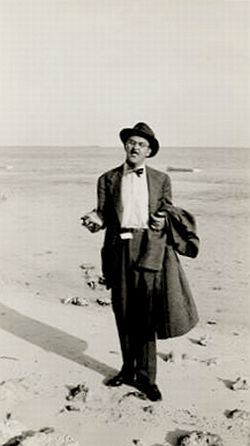
Charles Olson
b. 27 December 1910
Photo courtesy of the Charles Olson Research Collection,
University of Connecticut Libraries
Maximus, to himself
Charles Olson
I have had to learn the simplest things
last. Which made for difficulties.
Even at sea I was slow, to get the hand out, or to cross
a wet deck.
The sea was not, finally, my trade.
But even my trade, at it, I stood estranged
from that which was most familiar. Was delayed,
and not content with the man’s argument
that such postponement
is now the nature of
obedience,
that we are all late
in a slow time,
that we grow up many
And the single
is not easily
known
It could be, though the sharpness (the achiote)
I note in others,
makes more sense
than my own distances. The agilities
they show daily
who do the world’s
businesses
And who do nature’s
as I have no sense
I have done either
I have made dialogues,
have discussed ancient texts,
have thrown what light I could, offered
what pleasures
doceat allows
But the known?
This, I have had to be given,
a life, love, and from one man
the world.
Tokens.
But sitting here
I look out as a wind
and water man, testing
And missing
some proof
I know the quarters
of the weather, where it comes from,
where it goes. But the stem of me,
this I took from their welcome,
or their rejection, of me
And my arrogance
was neither diminished
nor increased,
by the communication
2
It is undone business
I speak of, this morning,
with the sea
stretching out
from my feet
The collected poems of Charles Olson excluding the Maximus poems google books_______________________
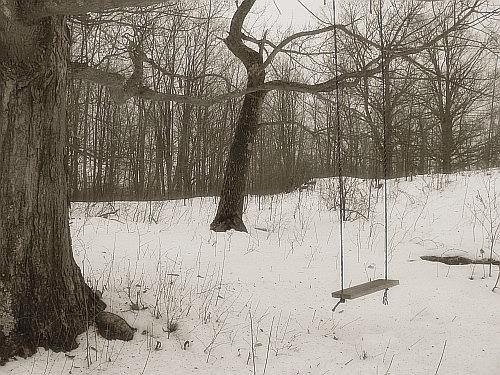
photo - mw
_______________________
Notes Toward a Supreme Fiction
Wallace Stevens
(....)
It Must Give Pleasure
(....)
VII
He imposes orders as he thinks of them,
As the fox and snake do.It is a brave affair.
Next he builds capitols and in their corridors,
Whiter than wax, sonorous, fame as it is,
He establishes statues of reasonable men,
Who surpassed the most literate owl, the most erudite
Of elephants.But to impose is not
To discover. To discover an order as of
A season, to discover summer and know it,
To discover winter and know it well, to find
Not to impose, not to have reasoned at all,
Out of nothing to have come on major weather,
It is possible, possible, possible.It must
Be possible.It must be that in time
The real will from its crude compoundings come,
Seeming at first, a beast disgorged, unlike,
Warmed by a desperate milk.To find the real,
To be stripped of every fiction except one,
The fiction of an absolute— Angel,
Be silent in your luminous cloud and hear
The luminous melody of proper sound.
VIII
What am I to believe?If the angel in his cloud,
Serenely gazing at the violent abyss,
Plucks on his strings to pluck abysmal glory,
Leaps downward through evening’s revelations, and
On his spredden wings, needs nothing but deep space,
Forgets the gold centre, the golden destiny,
Grows warm in the motionless motion of his flight,
Am I that imagine this angel less-satisfied?
Are the wings his, the lapis-haunted air?
Is it he or is it I that experience this?
Is it I then that keep saying there is an hour
Filled with expressible bliss, in which I have
No need, am happy, forget need’s golden hand,
Am satisfied without solacing majesty,
And if there is an hour there is a day,
There is a month, a year, there is a time
In which majesty is a mirror of the self:
I have not but I am and as I am, I am.
These external regions, what do we fill them with
Except reflections, the escapades of death,
Cinderella fulfilling herself beneath the roof?
...(more)
_______________________
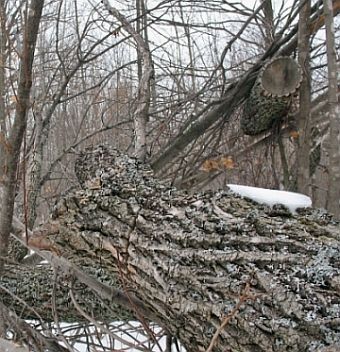
photo - mw
_______________________
Nothing but the World: An Interview with Jean-Luc Nancy
Rethinking Marxism, Volume 19, Issue 4 October 2007
cross-x
What I am saying here is obvious. But it is the naked obviousness of bare existence exposed to a judgment of sense that is exposed in its turn that alone gives us a chance, even if it also and at the same time unsettles us in an unprecedented way. I once used the motif of the "nude" or "bare" to speak of "places" laid bare, exposed or barren(what I called "divine places") to claim that in the place and stead of the dead God, a space of "places" expands and opens up, sites that can be occupied, inhabited, where something "takes place," and therefore makes sense - even though sense would no longer be given to us in the form of significations. With the word "nudity", what I say also converges with the "naked life" my friend Giorgio Agamben speaks of, even though I certainly don't share his own dramatization of what he calls "biopolitics." I would instead stress the resistance that is inevitably present and diffused within and even at the heart of the worst threats. One extreme - of domination, of proliferation - reveals another: laying bare and bringing into relief a disarray whose acuity is also in and of itself a testimony to a resistance, and within this resistance the tracing out of a "sense." What remains suspended between suicide and survival - someone might be tempted to characterize our situation in these terms - is also a suspense silently freeing up untold possibilities.
People often say I'm too "optimistic." Not at all. But that doesn't mean I'm a pessimist. Both of these postures are based on anticipations. All I ask is that we tenaciously stick to the present and not abandon it for some hazy horizon. Stick to the present of this world and to what is "awkward" about it. There is an age called "awkward" where a number of important issues converge and are put into play for a young person. We are very young, very restless, very lost - but not completely so. I believe in particular that right now a profound movement is taking place, a continental drift of sense or thought, between the thoughts of yesterday and those still to come, between those of the old West and those coming from the diverse elsewheres that are no longer elsewhere, and it is there that we discover plenty of tasks for thought. I obstinately keep coming back to this: there is nothing disincarnate or "apolitical" about this "intellectual" work. It's a great deal more than producing a series of political propositions. This work, or this worker, you, me, has his or her arms elbow deep in a pulp of representations, orientations, calls, and echoes, in a trituration and separating out of a common thinking matter, a work that is not only important for our mobility but is our very mobilization. So it is, moreover, with our interview. I'll stop with this seemingly calculated close. It is, of course, entirely provisional.
_______________________
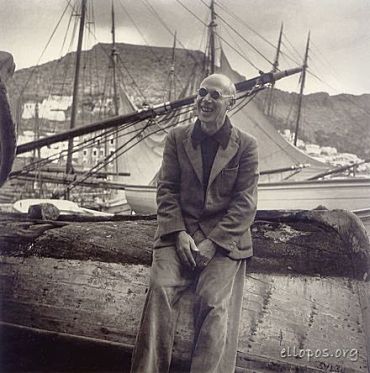 Henry Miller
b. 26 December 1891
Henry Miller in Hydra
1939
Photo by Giorgos Seferis George Seferis as a Photographer
Ellopos Photoblog
I want to make a detour of those lofty arid mountain ranges where one dies of thirst and cold, that "extra-temporal" history, that absolute of time and space where there exists neither man, beast, nor vegetation, where one goes crazy with loneliness, with language that is mere words, where everything is unhooked, ungeared, out of joint with the times. I want a world of men and women, of trees that do not talk (because there is too much talk in the world as it is!), of rivers that carry you to places, not rivers that are legends, but rivers that put you in touch with other men and women, with architecture, religion, plants, animals--rivers have boats on them and in which men drown, drown not in myth and legend and books and dust of the past, but in time and space and history.
-
Henry Miller, Tropic of Cancer
Henry Miller at google books
Tropic of Cancer
Tropic of Capricorn
Big Sur and the oranges of Hieronymus Bosch
Black Spring
Henry Miller: Exhibitionist of the Soul
Steve Erickson Conjunctions
Henry Miller at UbuWeb
_______________________
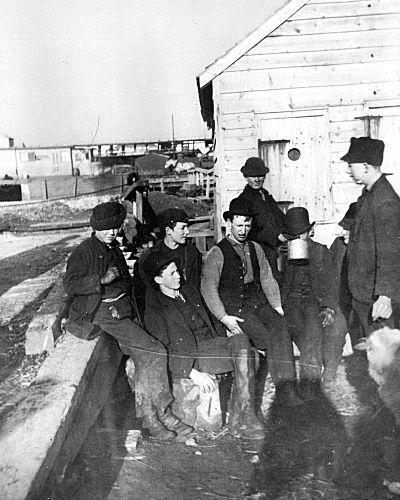
A growler gang in session
[the "Montgomery Guards'at the West 37 Street dock]
Jacob Riis
via a piece at Filboid Studge on Jacob Riis and Michael Angelo Woolf
_______________________
Alec Soth’s Top 10 Photobooks of 2009
Little Brown Mushroom Blog
_______________________
Richard Hoffman in a video interview with Elizabeth Lund
Richard blogs at Mnemosyne's Memes.
Two of his poems are in the current Janus Head.
_______________________
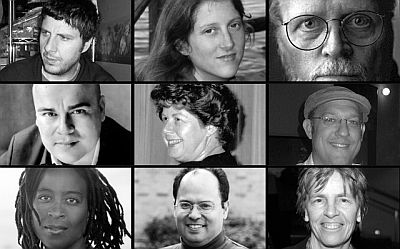
Nine poets on the decade in poetry
poetry foundation
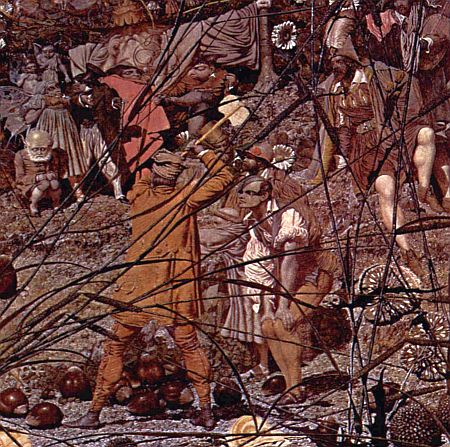
The Fairy Feller's Masterstroke
detail
1858-64
"bedlam"
Bethlem Hospital
Richard Dadd
1 2 3
Art: From the Dark Garden of the Mind
Robert Hughes on Richard Dadd
_______________________
Exegesis of the First Words Spoken (Ishmael)
Dan Beachy-Quick
Scholar-on-waves, a water-gazer,
Call me
Ishmael. Re-enter my own life.
Waves: they murmur, babble, waves
Do not articulate what the ocean
Turning in its bed thinks: What must be said.
Sing above or sing
Below
The knot in the plank, the cursive
Pine-grain
Of my life in the bow and my life
Bay-less in the bowels
Of the bow
I signed myself on as me
to become more so
myself—
A study, one volume of 36 signatures, 576 pages (9 blank for notes),
And became dispossessed of all
but one mis-
spoken leaf—
Pro- and epilogue both. Sign your mark. I do
Find the escape
Clause titled in fine print, watermarked, on condition
Of being or becoming: me
...(more)
An Interview with Dan Beachy-Quick [pdf]
Dan Beachy-Quick in Octopus, GutCult and Drunken Boat
Four Essays From A Whaler's Dictionary
Dan Beachy-Quick
gutcult
Reviews of Dan Beachy-Quick 1 2
World Tumbling into World
B. K. Fischer reviews A Whaler's Dictionary and This Nest, Swift Passerine by Dan Beachy-Quick
boston review
The Luminist's Notebook [pdf]
Dan Beachy-Quick
The Cultural Society
_______________________
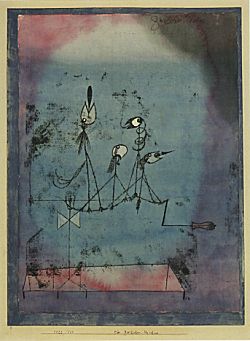
Twittering Machine
Paul Klee
1922
_______________________
Twittering Machine
Dan Beachy-Quick
I see I must rewire the Twittering Machine
Whose song was lightning
when lightning-struck—
And then sang singe, sang smoke: elect
-ric elegy, perpetual elegy, the fuse
That fused syllable to
sound is blown, is
Blown, and now the dry-throat on noting
Nothing drowns. The gold-sheathed wire
Soldered to star
sang both the star
’s celestial thread that fretting through
The night kept the night a needle-width
Undone, and sang
yellow the yellow
Thread unmending the sundress wife kept
In closet December-long. And longer:
Through darker months
none could name, none
Name—since, ever since, that star whose light
Powered the Twittering Machine’s ever-song
Died, was always dead,
though nightly seen,
Is still seen, cold but brilliant overhead. The gold
-sheathed wire withered, tangent to the moon.
Now a fungal-wire aches
down cemeteries
To find a decaying song. Earth-battery—
It winds the dynamo by a ceaseless, clock-
Work turn, clock-
wise turn,
But the Twittering Machine refuses song.
No, no—not refuse, not refuse. We’ve rewired
The mechanism. Stars
are silent, trustless:
They lock the dark vault they seem to pierce.
Music of the spheres? buzz, no test-pattern,
Program cancelled, shut.
Now one dark talon
Sheathed in darkness drops unseen from sky
And scratches the earth as the earth turns.
Do you hear that sound
of gravel on gravel
Grinding? That music is our music now.
Shampoo 24
_______________________
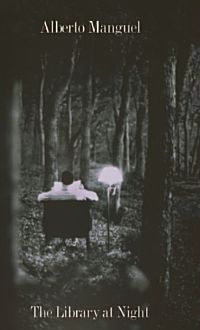
The Library at Night
Alberto Manguel
This roving humor (though not with like success) I have ever had, & like a ranging spaniel, that barks at every bird it sees, leaving his game, I have followed all, saving that which I should, and may justly complain, and truly (for who is everywhere is nowhere) . . . , that I have read many books, but to little purpose, for want of good method; I have confusedly tumbled over divers authors in our Libraries, with small profit, for want of art, order, memory, judgement.
-
Robert Burton, The Anatomy of Melancholy
The starting point is a question.
Outside theology and fantastic literature, few can doubt that the main features of our universe are its dearth of meaning and lack of discernible purpose. And yet, with bewildering optimism, we continue to assemble whatever scraps of information we can gather in scrolls and books and computer chips, on shelf after library shelf, whether material, virtual or otherwise, pathetically intent on lending the world a semblance of sense and order, while knowing perfectly well that, however much we’d like to believe the contrary, our pursuits are sadly doomed to failure.
Why then do we do it? Though I knew from the start that the question would most likely remain unanswered, the quest seemed worthwhile for its own sake. This book is the story of that quest.
pdf at aaaarg
_______________________
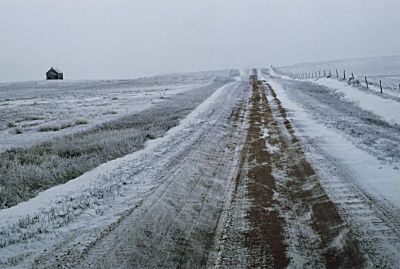
Belfield, N.D.
North Dakota, The Emptied Prairie
Charles Bowden
Photographs by Eugene Richards
National Geographic Magazine
_______________________
The Conservative-Christian Big Thinker
David D. Kirkpatrick on Robert P. George
"If there really is a vast right-wing conspiracy," the conservative Catholic journal Crisis concluded a few years ago, "its leaders probably meet in George's kitchen."
Back to the CavesO Solovieva
Printculture
This NYT article struck me as a sinister welcome back from an enlightened world to the dark, nightmarish caves, where all knowledge about the condition of humanity brought to us by enormous efforts of science and development of social consciousness has to be abandoned again. To have to start arguing the basic case for the Enlightenment from scratch feels like intellectual rape: incredibly boring, annoying, painful. Robert P. George, the Princeton professor, makes the Christian Right's cause even more sinister because in his case it can't be blamed on ignorance. His is the pure joy of the pursuit of human unhappiness, reminding me of the eerie pastor and his house from Bergman's Fanny and Alexander....(more)
_______________________
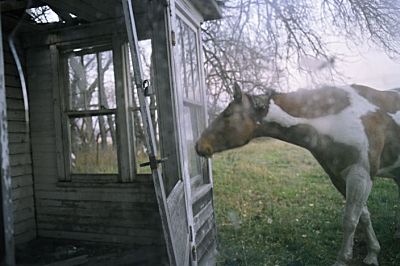 Walum, N.D.
Eugene Richards
_______________________
But often, in the world's most crowded streets,
But often, in the din of strife,
There rises an unspeakable desire
After the knowledge of our buried life;
-
Matthew Arnold (24 December 1822 - 15 April 1888), The Buried Life
_______________________
Round Time
W. S. Di Piero
Threepenny Review
Certain art gets fresh with us. It stings with what it offers because it says, on any given repeat, something we’re not prepared to hear, though we think we know it so well that it can’t turn on us. We can feel a little insulted by the impudence of renewal.
_______________________

Whirled of Kelly
Walt (Pogo) Kelly blog...
Thomas Haller Buchanan
via mosses from an old manse
_______________________
[Record no oiled tongue]
Dan Beachy-Quick
(....)
Can it be
So many wake the forest glows
With sight? See and am seen. A pulse
At the stump is breath and rest
And breath again. Infinite
In store the game of this land.
Note the plumage of the turkey.
Note the thick meat at breast.
Sap: syrup. Pine: plank. A copse
Of wood is cord for furnace. A copse
Is cottage, too. The owl in the hollow
Tree screeches because I am too close
To truth. Note the almond
Tree overmuch with fruit. The almond
Pressed is oil sweet. The almond bit
Is a smoky meat that leaves—note it:
The tongue bathed in oil.
...(more)
Dan Beachy-Quick at The Poetry Foundation
_______________________
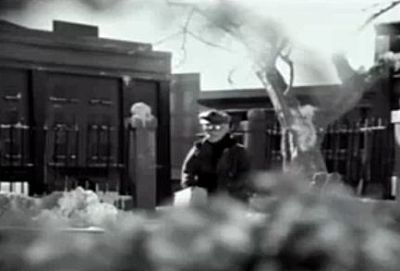
WS Burroughs: The Junky's Christmas
The Allen Ginsberg Project
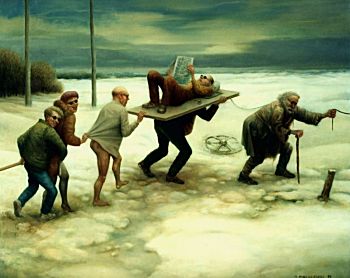
Jaroslaw Miklasiewicz
Paintings of Jesters, Irony, Village Idiots
_______________________
The Anonymity of Snow
Dylan Trigg
(....)
Outside, human life has adapted well to this white terrain. With cautious movements and contrived happiness, the falling snow dissolves boundaries between different lifeworlds. Human life regresses: the haggard smiles of adult faces exceed their allotted dosage, now resembling a musty shadow of a primitive childhood state. Over the grey and white blocks of sedimented materiality, cracks form and the soft skin surrounding the eyes of adult faces begin to sag against the white flesh of the world.
But all this is quite remote from Bachelard. True, we know from him that snow is constitutive of an immemorial memory, conferring a depth of presence upon the world. Snow is the centre, and the house is the axis through which the universe is channelled. Yet owing to Bachelard’s agoraphobic relation to the outside, for him, snow is only conceived as a thing pressing down and reinforcing the fortitude of the house. Never does he encounter the house as yielding to its own otherness: that is, as viewed from the outside. Indeed, at times he will go so far as to say that winter is a “simplified cosmos,” marking a “non-house,” which ultimately entails a “cosmic negation”.
What did Bachelard omit in this refusal to move beyond the inside? ...(more)
_______________________
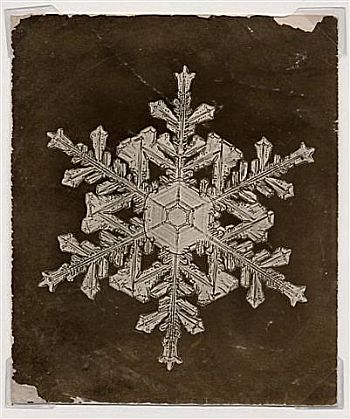
Wilson Alwyn Bentley
1865 - 1931)
_______________________
Double Sonnets
Camille Martin
Stride
Scattering Dust is Good Practice
scattering dust is good practice. like
bouncing voices off the floor and out
the window into the fog. i suspect the future
of withholding evidence. if i wait
long enough, dust will find an upward drift
and encounter fewer obstacles. through the open
window, tomatoes ripen on a stone, machines
arrive to paint a rainbow. see the colours? they
are the children who sing the same nursery
rhymes five hundred years later, fluttering
their coded soundwaves into history. something
has come to pass that never was before, maybe
the hum of the fridge, more constant
than air, more peaks and troughs than drops
in a monsoon. catastrophic, it bears no ill. no
slippage, no tears, no savage sky. it captures
what it came to capture and fritters
into the future along with the rush of traffic.
as never before, i believe the moon is made
of glass, as solid as the animal whose name
i can't remember. but breakable. i sprang
from scorched earth and started walking
until i heard voices from windows.
it's humbling to realize that most of the time
i spend waiting for myself to carry
objects to another time, another place,
and then to be bled as if it were a cure
for the recurrence of the feeling of nothing
left to do but scatter dust, just in case.
...(more)
Stride magazine
Camille Martin - Rogue Embryo
_______________________
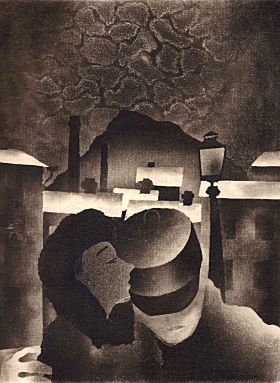
illustrations
for Joseph Kessel's Les Nuits de Siberie (1928)
Alexander Alexeieff
1901 - 1982
A Journey Round My Skull
_______________________
List Of Scenes Of My Childhood To Be Written
Raymond Federman
Vice Magazine
Excerpted from Shhh: A Story of Childhood, forthcoming from Starcherone Books.
11. Scene describing the house in Argentan in which the Germans put us, and where we stayed for almost a year, and how my mother would fix the German soldiers’ uniforms, do their laundry, press their shirts, and how my father would get stuff from the black market for the German soldiers, and how they would bring us food, and how in the evening German soldiers came to our house to discuss politics with my father, and how I would go to the store to buy bottles of beer for the German soldiers, and how before leaving late in the evening they would all raise their left fists and together with my father would sing “The International,” and me, too, I would sing with them in a soft voice. The German soldiers who came to our house were all Communists, like my father. My father explained to me that the best place for German Communists to hide was in the army.
12. Scene demonstrating how verisimilitude often becomes improbable when one tells a story.
...(more)
_______________________
the law of falling bodies
theodore best
: i
Shod smithy begets harrowed womb,
Dissent of the brown axle
Whose remit reveres the godly board,
The cortex of that fallow boon
A furrowed far conceit beneath
The need of past and future thought.
Euclid’s plough persists against all
False notes of that inapt grey,
Being lost to the strung strain
Of clocks upon their pedestals;
It’s eternity that centres selves
With tongues of an abacist constrain.
Antiquity has said of time that
It is incapable of substance.
Is the world such, bound to many mirrors, that
I must bear the standard? What reluctance is here.
If hung by the formulae, new born to dotard,
Ascending, descending with an impoverished bent
For the crest, or by the fall, oh felix culpa!
I too would be surrendered to dreams!
This postulate would not be threatened
By the reveries of a beyond.
Kronos’ axiom spins above
With arms of unintelligible children;
Born, eaten, negligible as time.
...(more)
deaddrunkdublin & other imaginal spaces
_______________________
Desert Island Reading: A Return to Beckett
Amy McDaniel
HTMLGIANT
... Since then, I have felt, somehow, as if I couldn’t withstand Beckett’s prose on my own, the dead weight of his sentences, his spine-twisting anti-proverbs, the desolation, the threat. But there I lay, on a brilliantly sunlit balcony overlooking the Gulf of Mexico, staring into Beckett’s considerably less sunny universe. And now I’m going to try to convince you why you, too, should turn, or return, to Beckett, Watt specifically....(more)via Rhys Tranter
_______________________

“Heightened Vigilance Will Defend our Jesusland!”
driftglass
_______________________
Let Nothing Ye Dismay
Les Standiford
Chapter 10:'The Man Who Invented Christmas'
There were no Christmas cards in 1843 England, no Christmas trees at royal residences or White Houses, no Christmas turkeys, no department-store Santa or his million clones, no outpouring of "Yuletide greetings," no weeklong cessation of business affairs through the New Year, no orgy of gift-giving, no ubiquitous public display of nativity scenes (or court fights regarding them), no holiday lighting extravaganzas, and no plethora of midnight services celebrating the birth of a savior. In fact, despite all of Dickens's enthusiasms, the holiday was a relatively minor affair that ranked far below Easter, causing little more stir than Memorial Day or St. George's Day does today. In the eyes of the relatively enlightened Anglican Church, moreover, the entire enterprise of celebrating Christmas smacked vaguely of paganism, and were there Puritans still around, acknowledging the holiday might have landed one in the stocks....(more)

Dawn after the Wreck
c.1841
William Turner
d. Dec. 19, 1851
_______________________
On the Inside of Poems
Nicolas Born
Translated by Eric Torgersen
You can't make a living
competing with reality
you can't live on reality either
you can survive an operation
and get everything back
and go on through Life
through quickly fading pictures
that was you
you and the One in the Oven
Persons panting under their tombstones--
With unspeakable exertion
by you and all your ancestors
you shield yourself
Land and water remain
the sky remains
and you remain
you have nothing to get ready for
little suns light your democracy And
you choose life and death
you have many Beautiful Voices
you are many
your skin is your skin And finally
nothing but skin
you're the entrepreneur of Life
impresario of white apparitions
you're the Spaceman out in the universe
the author of the course of history
you can print time like books
you dice and sieve and love And the ruins
of dictating machines are blowing in the wind
unreason is in full bloom
...(more)
Four poems from Das Auge des Entdeckers (The Discoverer's Eye)
Nicolas Born
Translated by Eric Torgersen
exquisite corpse
_______________________

Kodak factory at Harrow
1890s'
Points of View
capturing the 19th century in photographs
via tasting rhubarb
_______________________
from
flaming telepaths
Lauren Levin
GutCult
(....)
An image is as a spatial map of property (change,
reflection) mapped from another's. she has their memories,
is that fair (to yoke a whole species of thinking)
Personal cells inside her become clutched to one view
of a character. Her secret satisfaction in discomfiture
re-awakens their
long forgotten memories.
Re-invest essences
in themselves, with particles
it makes them in a ribbon
collapsing in spirals spinning on itself as it moves forward a buzz
in combustible, cognitive dreams: the gold toenails of pleasure - the person,
the person interrupts at the staircase looking over, that quiet moment
discussing family news. --what i kiss , a symbol
of friend.
...(more)
more on Lauren Levin from Ron Silliman
_______________________
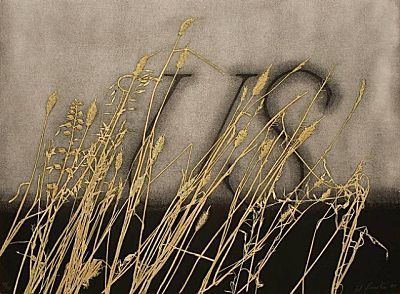
Ed Ruscha
The Poetry of Ed Ruscha
Elaine Equi
jacket
_______________________
Global justice and the renewal of critical theory
A dialogue with Nancy Fraser
eurozine
For me, justice and law are not on the same level. In my conception, justice consists in the absence of socially institutionalized obstacles to participatory parity. Law, in contrast, is one among several different vehicles through which such obstacles can be institutionalized. Thus, while some obstacles to participation, such as the prohibition on gay marriage, are directly and expressly juridified, others are institutionalized non-juridically – via market processes, family forms, professional cultures, communicative constructions and/or informal practices in civil society. It follows that not all recognition struggles are properly directed at legal change; some, rather, should target these other modes of institutionalization.
(....)
... the idea of an anthropological need for culture suggests a picture of the world in which everyone has or desires one and only one cultural home, which is sharply bounded and distinguished from others, and which should be valued and preserved intact. Whatever its merits for earlier times (which I doubt!), this picture is deeply at odds with forms of life in the present era of globalization. In today's world of transcultural interaction, hybridization is so intense that no one can say authoritatively where one culture ends and another one begins. To speak of a deep anthropological need for a valued cultural home in this context can only be nostalgic and conservative. A more fruitful approach would interrogate power asymmetries among peoples who identify with different cultures, with the aim of disclosing injustices – in the sense of obstacles to parity of participation. But the question still remains, how are such obstacles best dismantled?...(more)
Rethinking RecognitionNancy Fraser
Transnationalizing the Public SphereNancy Fraser
Justice as Redistribution, Recognition and RepresentationInterview with Nancy Fraser Barcelona Metropolis
Feminism, Capitalism And The Cunning Of History
Nancy Fraser
Interview with Nancy Fraser
October 23, 2009
European Alternatives
_______________________
The Ugly Canadian
Nine ways we are ruining our once enviable reputation in the world.
Murray Dobbin
_______________________
Democracy Canadian-style: How do you like it so far?
Lawrence Martin
via mirabile dictu
_______________________
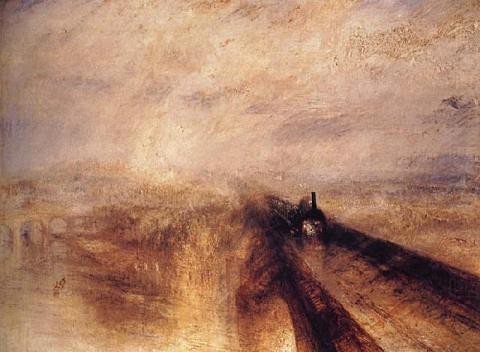
Rain Steam and Speed
The Great Western Railway
1844
William Turner
_______________________
The Obama Code: Ghosts and Monsters in the Visual Datasphere
Carolyn Erler
ctheory
To explore the idea of genomic embodiment in Internet images of Barack Obama, I will examine how visual codes, Hebrew lettering and imaginary genetic sequences loop into and through one another in a seemingly post-literate, biotechnological blur. In this richly vague space, where something primordial appears to be happening, I find trace elements of Arthur Kroker's posthuman universe in which "the missing mass of God touches the full-spectrum dominance of cyberculture." In Kroker's view, this touch is of a magnitude to bend space-time relations into a new fabric "simultaneously mythic and historical, past and future, technocratic and religious." The images in this essay are considered in light of this theoretical possibility: a dimensional infolding of visible spaces becoming touched by God....(more)
_______________________
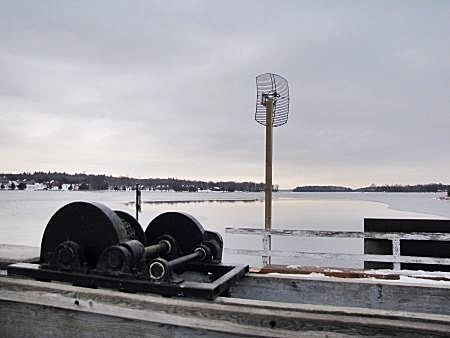 weir
Narrows Lock
photo - mw
_______________________
The Chameleon Effect
Marko Zlomislic
ctheory
Are we asking too much of philosophy when we expect it to finally give birth to an event that would transform the coordinates of our entrenched positions?
Can there be a step outside of the legacy we have inherited that would not only radically transform the state of things, but also more importantly allow justice to happen?
I fear the opposite will happen; little dictators riding horses or Lear jets, will always seduce Nietzsche's little man. Rather than justice, CEO's who ride on the backs and minds of the masses into entrepreneurial bliss will be praised for their blackberry wisdom, packaged ready-made like six ply toilet paper that never suffers from a recession or a downturn in consumer confidence because the space of its utilization never changes. ...(more)
_______________________
Buddhist Economics
E. F. Schumacher
Economists themselves, like most specialists, normally suffer from a kind of metaphysical blindness, assuming that theirs is a science of absolute and invariable truths, without any presuppositions. Some go as far as to claim that economic laws are as free from "metaphysics" or "values" as the law of gravitation. We need not, however, get involved in arguments of methodology. Instead, let us take some fundamentals and see what they look like when viewed by a modern economist and a Buddhist economist.
via One Eyed Crow
_______________________
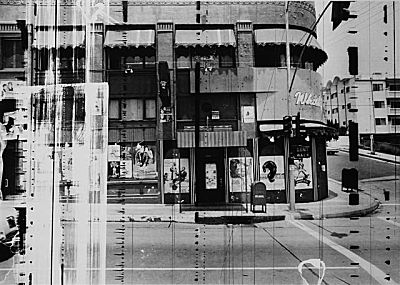
Sunset strip
Ed Ruscha
_______________________
inside gertrude stein
Lynn Emanuel
Right now as I am talking to you and as you are being talked
to, without letup, it is becoming clear that gertrude stein has
hijacked me and that this feeling that you are having now as
you read this, that this is what it feels like to be inside
gertrude stein. This is what it feels like to be a huge type--
writer in a dress.
(...)
Because someone must be gertrude stein, someone must save
us from the literalists and realists, and narratives of the
beginning and end, someone must be a river that can type.
And why not I? Gertrude is insisting on the fact that while I
am a subgenius, weighing one hundred five pounds, and living
in a small town with an enormous furry male husband who is
always in his Cadillac Eldorado driving off to sell something
to people who do not deserve the bad luck of this mer-
chandise in their lives--that these facts would not be a prob-
lem for gertrude stein. Gertrude and I feel that, for instance, in
Patriarchal Poetry when (like an avalanche that can type) she is
burying the patriarchy, still there persists a sense of con-
descending affection. So, while I'm a thin, heterosexual sub- genius, nevertheless gertrude has chosen me as her tool, just
as she chose the patriarchy as a tool for ending the patriarchy.
(...)
And so, yes, I say, yes, I am here, gertrude,
because we feel, gertrude and I, that there is real urgency in
our voice (like a sob that can type) and that things are very
bad for her because she is lost, beset by the literalists and
realists, her own enormousness crushing her and we must
find her and take her into ourselves, even though I am the
least likely of saviors and have been chosen perhaps as a last
resort, yes, definitely, gertrude is saying to me, you are the
least likely of saviors, you are my last choice and my last
resort....(more)
_______________________
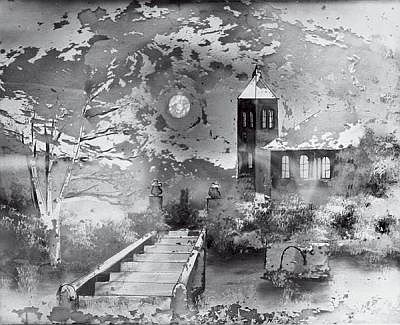
Passage to Never Land
Clarence John Laughlin
1958
_______________________
Still: Literature of the Mountain South
first issue
...published three times a year, in October, February and June. Our mission is to provide a free website that offers the finest in contemporary literary writing of Central Appalachia, or the Mountain South. via NewPages Blog
_______________________

Narrows Lock weir
photo - mw
_______________________
Counterfeits
Carmen Firan
Translated from the Romanian by Adam J. Sorkin and Carmen Firan
words without borders
how many words do we need to make ourselves clear?
in cubicles and cells papered with thick letters
we throw each other all-purpose slogans
air balls that slam us in the chest, knock us down
flying erratically—
awkward counterfeits in the absence of genuine wings
used only in commercials for organic chickens
raised by fake farmers
somewhere between Earth and Mars
for how long can the orphic whispers distract death
from its course over bright cliffs
where trembling silhouettes are the only thing you can see?
how loudly can we wail smothered inside these four walls?
...(more)
|
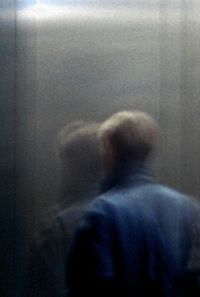

 Janus Head
Janus Head

 The Age of Briggs & Stratton
The Age of Briggs & Stratton




































